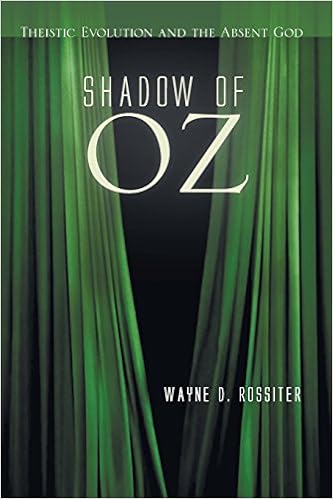 From Waynesburg University (Pennsylvania) biology prof Wayne Rossiter, author of In the Shadow of Oz, From If Apes Could Fly: Review of Darwinism and Natural Theology, Chapter 2 (R.J. Berry):
From Waynesburg University (Pennsylvania) biology prof Wayne Rossiter, author of In the Shadow of Oz, From If Apes Could Fly: Review of Darwinism and Natural Theology, Chapter 2 (R.J. Berry):
R.J. Berry (former professor of Genetics at the University of London) offers the second chapter in the volume. It begins with a short, but informative biography of Darwin’s life and the events leading up to the Origin.
Like Monty Python’s knight on the bridge, Berry continues to hack away at the body of Christian theology while maintaining that we’re all the better for it. The next limb to go is a classic one. Nearly all theistic evolutionists abandon the concept of the Fall of man, in favor of a “falling up” view that sees us evolving towards perfection, not devolving away from it. Berry is no different. Quoting Peter Bowler, he offers, “If evolutionism [is] true—even in its progressionist and teleological form—there could be no Fall and hence no need for salvation in the original sense of the term.” This is more damning than most know. If we (as Karl Giberson has argued) are designed evil through the process of selfish evolution, then our very nature was created evil. Are we culpable? And, assuming that the “falling up” is simply our increasing awareness of how evil we are, rectification is in our hands, not the work of the cross. Jesus isn’t necessary. Berry puts it more plainly; “No Adam, no Fall; no Fall, no Atonement; no Atonement, no Saviour.”
So how does Berry salvage the most fundamental piece of Christian theology? By abandoning the need to reference, or find agreement with, science. While he can find no evidence of the Creator’s hand in our evolutionary unfolding, nor any indication of a spiritual aspect of our being, it’s not possible to give all of these up and call the remaining theology “Christianity.” So, Berry (et al.) uses science to systematically dismantle every other claim from the Christian tradition, entirely vacating God’s direct activity from all parts of the creation. . . only to slip the central Christian dogma back in, well below the radar of scientific detection. He writes, “This is where the science-faith dialogue comes against the ‘grand narrative’ of traditional Christianity. Science can give an account of human evolution without invoking God, but this does not mean that there is no God.” Hmm. I suppose Berry’s right. And, science cannot disprove the existence of a flying spaghetti monster, or Zeus, or Zoroaster. Quick, go tell the others! Here, the very thing in question is assumed in the absence of any evidence. In other words, such a claim falls entirely into the meat grinder of the Invisible Gardener fallacy.
More.
Is a theistic evolutionist someone who, having to choose between theism and evolution, would unhesitatingly choose the second?
See also: Wayne Rossiter: No “I” in “me” and no sense in Sam Harris